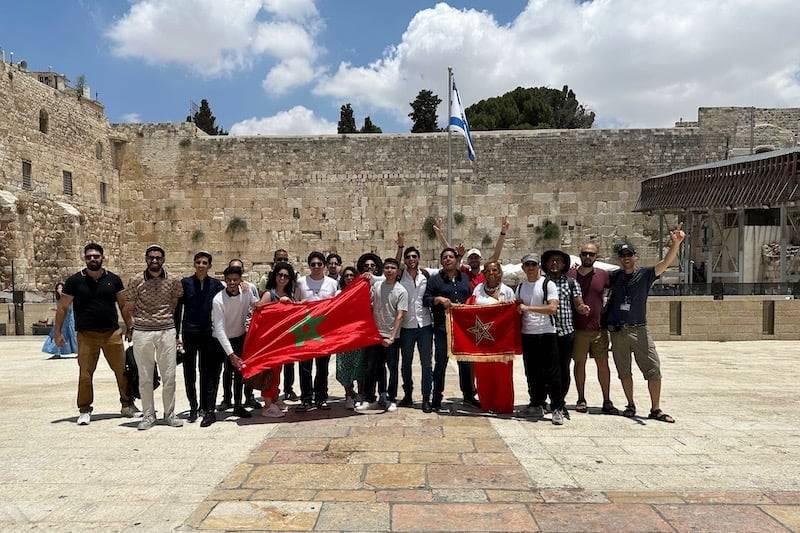The visit of 24 Moroccan youths to Israel, organized by the "Morocco for Coexistence" association in collaboration with the "Partnership" foundation based in Tel Aviv, and funded by the German government, has sparked considerable controversy on social media. This visit included meetings with Israeli officials, notably Amir Ohana, the Speaker of the Knesset, and former Israeli National Security Advisor Meir Ben-Shabbat. The controversy intensified due to its timing, coinciding with the ongoing war in Gaza, which a substantial part of the Moroccan population condemns, calling for the cancellation of "normalization" and severing relations with Israel.
While organizers of the visit, which runs until July 13, defended it despite being filmed dancing at a concert alongside Israeli citizens in Jerusalem, arguing that they have the right to express their personal convictions and solidarity with a "friendly state" that recognizes Morocco's sovereignty over its southern territories, critics labeled this visit as a "deviation" from the popular stance often expressed by Moroccans who have taken to the streets to voice their opposition to Israel's actions against Palestinians.
Feisal Marjani, the founding president of the "Morocco for Coexistence" association, who led the Moroccan youth delegation to Israel, stated that "this visit does not represent the positions of Morocco at either the official or popular level, nor does any party have the right to monopolize the representation of the kingdom on these two fronts or to strip anyone of their patriotism or accuse them of treason or complicity when they express their personal beliefs." He added that "the youth's visit to Israel is part of contributing to the development of Moroccan-Israeli relations, historically beyond the signing of the Abraham Accords."
Marjani explained in a conversation with Hespress that "twenty-first century Morocco, according to its constitutional references, accommodates all voices, including those advocating the development of relations with Israel or those opposing it, according to a constitutional logic that guarantees the right and freedom of expression." He noted that "the youths who visited Israel aim to support this state that recognized Morocco's sovereignty over the Sahara during its most challenging moments with Hamas, a principle mandated by the solidarity that frames international relations with friendly countries."
The speaker emphasized that "those who oppose today the establishment of normal relations with Israel are opposing Morocco’s strategic interests, as they have never commented on the positions of Palestinian factions regarding the territorial integrity of the kingdom, nor on the dubious relations of some of these factions with Iran, which the Moroccan Foreign Ministry has acknowledged supports separatism in Moroccan Sahara."
Marjani expressed regret that "the issue of the territorial integrity of the kingdom, which is a constant in the kingdom's principles, is merely a secondary concern for those attacking us, as they remain silent when it comes to certain parties that base their distant concerns on our strategic and developmental issues as Moroccans." He pointed out that "some have even reached the point of questioning the credibility of sovereign institutions and ministries to serve an agenda that aims to exploit Morocco's position on the Palestine conflict, in which the kingdom has taken advanced positions and initiatives that align with the ambitions of the Palestinians themselves."
Criticism of the visit was described as "unacceptable" by Aous Al-Rimal, president of the Unification and Reform Movement, who stated that "this youth visit to Israel is primarily a deviation from the near consensus of Moroccans around the issue of normalization with this occupying entity and the necessity to sever all relations with it." He added, "Those who want to travel to Israel do not need justification or to hide behind the pretext of developing relations or any other excuses, as evidenced by the fact that these individuals were going to Israel even before normalization, but they did so in secrecy before it became public."
Al-Rimal criticized "the attempt to whitewash Israel's image, which directly stated after the signing of normalization agreements that the issue of the Sahara does not concern it, leaving it to the United Nations to resolve." He highlighted the provocative actions of the Israeli Prime Minister, who deliberately displayed a map of Morocco distorted by the absence of its Sahara for specific purposes.
The head of the Unification and Reform Movement insisted that "the Moroccan popular decision is clear: an absolute rejection of establishing any relations with this entity." He noted that "some educated young people holding higher degrees had previously traveled to Israel with the assistance of associations facilitating their travel under attractive employment contracts, only to find themselves compelled to work as spies from within the occupied Palestinian territories."
He concluded that "the reception of the youths who visited Israel by senior leaders and politicians reveals the truth of Israel's efforts to exploit them to whitewash the image of an occupation that has become tarnished among all peoples and states due to the daily crimes and massacres it commits against the Palestinian people."




